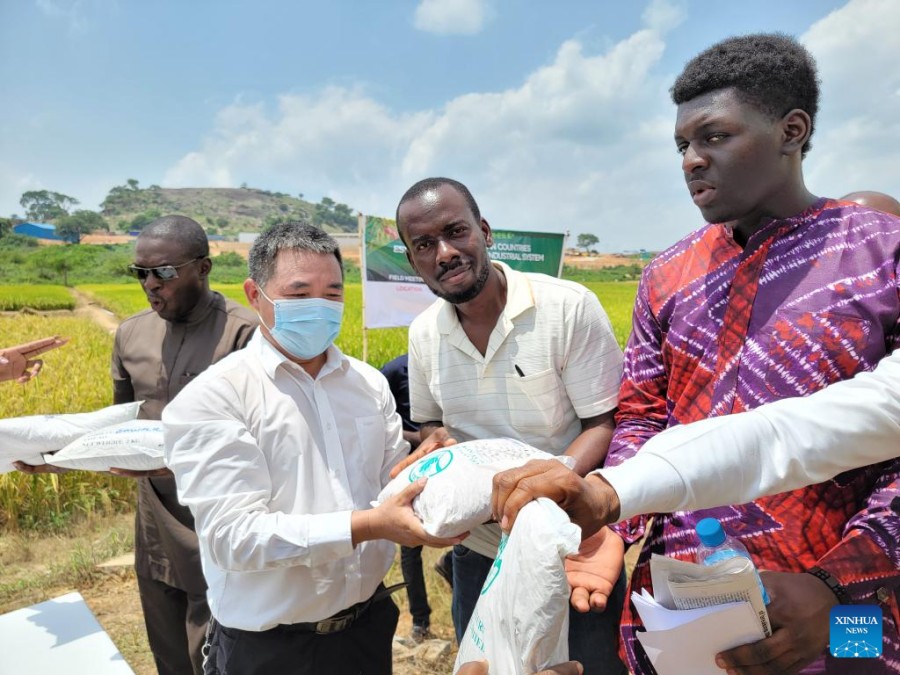Science and Technology Backyard project gives boost to Africa's agricultural development
Looking back on his experience of taking part in the Science and Technology Backyard project, David Muttendango, a Zambian student at China Agricultural University, said he has learned a lot.
The learning experience, which included testing soil fertility in a lab, checking the growth of crops in the fields, sharing experience in selecting seeds and cultivating seedlings with farmers, and having discussions with agricultural experts on the promotion and popularization of agricultural technologies, has been rewarding, according to Muttendango.

Chinese agriculture expert Wang Xuemin (2nd L) hands over rice seeds to local people at a demonstration farm operated by a Chinese firm in Abuja, Nigeria, June 2, 2022. [Xinhua/Guo Jun]
China has vigorously developed modern agricultural technologies and significantly improved crop yields, he pointed out, telling People's Daily that he wants to learn the technologies involved so that he can contribute to agricultural development in his hometown.
The project that Muttendango benefited from was based at Quzhou Experiment Station of China Agricultural University (CAU), and launched in 2019. It aims to train talents in agricultural science and technology for African countries through farming practice and technological exchanges.
Adopting an educational model that emphasizes the importance of practice and the combination of practice and theory in solving problems, the project arranges for foreign students to take part in farming activities, first to discover problems, then to acquire basic knowledge and methods through theoretical courses, and finally to go to the front line of agricultural production to solve problems using the theoretical knowledge they have gained.
Muttendango is one of the first batch of students of the project. Corn yield in Zambia has long remained at between 1 and 3 tonnes per hectare, while in China it has exceeded 6 tonnes since 2020, he noted, adding that he came to China to learn how the country improves crop yields through agricultural technologies.
After more than three years of learning in China, Muttendango has found the answer to his question. He discovered that while Zambian farmers seldom take measures to replenish their soil with nutrients, most Chinese farmers have a good knowledge of scientific fertilization methods. Furthermore, the selection of high-yield crop varieties and improvement in irrigation facilities for farmland, among other practices, also contribute to the increase in crop yields, according to Muttendango.
So far, the project has trained more than 60 students for 12 African countries.
The Food and Agriculture Organization of the United Nations (FAO) has given high praise to the project for its practice-based educational model, and recognized it as one of the best poverty reduction practices in 2021.
In 2022, a demonstration village for agricultural development and poverty reduction under the Science and Technology Backyard project was unveiled in Malawi. At the village, students taking part in the project seek technological innovations and conduct demonstrations and experiments together with local farmers, in a bid to improve farmers' agricultural production skills and increase crop yields.
Many African countries are faced with challenges such as food insecurity and poverty, pointed out a Malawian student of the CAU, noting that the Science and Technology Backyard project not only helps African students master advanced agricultural technologies, but also promotes the sustainable development of agriculture in Africa.
"The Science and Technology Backyard project focuses on exchanges in agricultural technologies between China and African countries and the cultivation of talents, so as to help more African farmers benefit from China's advanced agricultural technologies," said Wang Wen, an official of the College of Resources and Environmental Sciences, CAU.
























